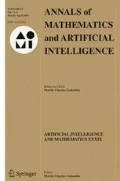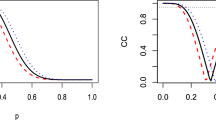Abstract
We introduce the notion of combinatorial vote, where a group of agents (or voters) is supposed to express preferences and come to a common decision concerning a set of non-independent variables to assign. We study two key issues pertaining to combinatorial vote, namely preference representation and the automated choice of an optimal decision. For each of these issues, we briefly review the state of the art, we try to define the main problems to be solved and identify their computational complexity.
Similar content being viewed by others
References
F. Bacchus and A. Grove, Graphical models for preference and utility, in: Proceedings of the 11th Conference on Uncertainty in Artificial Intelligence (UAI'95) (1995) pp. 3–10.
F. Bacchus and A. Grove, Utility independence in a qualitative decision theory, in: Proceedings of the 5th International Conference on Principles of Knowledge Representation and Reasoning (KR'96) (1996) pp. 542–552.
S. Benferhat, C. Cayrol, D. Dubois, J. Lang and H. Prade, Inconsistency management and prioritized syntax-based entailment, in: Proceedings of the 13th International Joint Conference on Artificial Intelligence (IJCAI'93) (1993) pp. 640–645.
S. Benferhat, D. Dubois, S. Kaci and H. Prade, Bipolar representation and fusion of preference in the possibilistic logic framework, in: Proceedings of the 11th European Conference on Artificial Intelligence (ECAI2002) (2002) pp. 421–429.
C. Boutilier, Toward a logic for qualitative decision theory, in: Proceedings of the 4th International Conference on Principles of Knowledge Representation and Reasoning (KR'94) (1994) pp. 75–86.
C. Boutilier, F. Bacchus and R. Brafman, UCP-networks: a directed graphical representation of conditional utilities, in: Proceedings of the 17th Conf. on Uncertainty in Artificial Intelligence (UAI-2001) (2001) pp. 56–64.
C. Boutilier, R. Brafman, H. Hoos and D. Poole, Reasoning with conditional ceteris paribusstatements, in: Proceedings of the 15th Conf. on Uncertainty in Artificial Intelligence (UAI'99) (1999) pp. 71–80.
C. Boutilier and H. Hoos, Bidding languages for combinatorial auctions, in: Proceedings of the 17th International Joint Conference on Artificial Intelligence (IJCAI'01) (2001) pp. 1211–1217.
R. Brafman and N. Friedman, On decision-theoretic foundations for defaults, in: Proceedings of the 14th International Joint Conference on Artificial Intelligence (IJCAI'95) (1995) pp. 1458–1465.
G. Brewka, S. Benferhat and D. Le Berre, Qualitative choice logic, in: Proceedings of the 8th International Conference on Knowledge Representation and Reasoning (KR2002) (2002) pp. 158–169.
T. Bylander, The computational complexity of propositional STRIPS planning, Artificial Intelligence 69 (1994) 161–204.
M. Cadoli, F. Donini, P. Liberatore and M. Schaerf, Comparing space efficiency of propositional knowledge representation formalisms, in: Proceedings of the 5th International Conference on Principles of Knowledge Representation and Reasoning (KR'96) (1996) pp. 364–373.
J.-Y. Cai, T. Gundermann, J. Hartmanis, L. Hemachandra, V. Sewelson, K. W. Wagner and G. Wechsung, The Boolean hierarchy I: structural properties, SIAM Journal on Computing 17(6) (1988) 1232–1252.
C. Cayrol, M. Lagasquie-Schiex and T. Schiex, Nonmonotonic reasoning: from complexity to algorithms, Annals of Mathematics and Artificial Intelligence 22(3-4) (1998) 207–236.
V. Conitzer, J. Lang and T. Sandholm, How many candidates are required to make an election hard to manipulate?, in: Proceedings of the 9th Conference on Theoretical Aspects of Rationality and Knowledge (TARK-03) (2003) pp. 201–214.
V. Conitzer and T. Sandholm, Complexity of manipulating elections with few candidates, in: Proceedings of the 18th National Conference on Artificial Intelligence (AAAI-02) (2002) pp. 314–319.
V. Conitzer and T. Sandholm, Vote elicitation: complexity and strategy-proofness, in: Proceedings of the 18th National Conference on Artificial Intelligence (AAAI-02) (2002) pp. 392–397.
S. Coste-Marquis, J. Lang, P. Liberatore and P. Marquis, Expressivity and succinctness power of preference representation language, Manuscript (2003).
M. de Condorcet, Essai sur l'application de l'analyse à la probabilité des décisions rendues à la pluralité des voix, Paris (1785).
C. Domshlak, Modelling and reasoning about preferences with CP-nets, Ph.D. thesis, Ben-Gurion University (2002).
C. Domshlak and R. Brafman, CP-nets: reasoning and consistency testing, in: Proceedings of the 8th International Conference on Knowledge Representation and Reasoning (KR2002) (2002) pp. 121–132.
J. Doyle and R. Thomason, Background to qualitative decision theory, AI Magazine 20 (1999) 55–68.
J. Doyle and M.P. Wellman, Preferential semantics for goals, in: Proceedings of AAAI-91 (1991) pp. 698–703.
J. Doyle, M.P. Wellman and Y. Shoham, A logic of relative desire (preliminary report), in: Proceedings of the 6th Intern. Symposium on Methodologies for Intelligent Systems (1991) pp. 16–31.
D. Dubois, H. Fargier and P. Perny, On the limits of ordinality in decision making, in: Proceedings of the 8th International Conference on Knowledge Representation and Reasoning (KR2002) (2002) pp. 133–144.
T. Eiter and G. Gottlob, On the complexity of propositional knowledge base revision, updates and counterfactuals, Artificial Intelligence 57 (1992) 227–270.
T. Eiter and T. Lukasiewicz, Complexity results for default reasoning from conditional knowledge bases, in: Proceedings of KR-2000 (2000) pp. 62–73.
N. Friedman and J. Halpern, On the complexity of conditional logics, in: Proceedings of the 4th International Conference on Principles of Knowledge Representation and Reasoning (KR'94) (1994) pp. 202–213.
H. Geffner, Default Reasoning: Causal and Conditional Theories (MIT Press, 1992).
S. Konieczny, J. Lang and P. Marquis, Distance-based merging: a general framework and some complexity results, in: Proceedings of the 8th International Conference on Knowledge Representation and Reasoning (KR2002) (2002) pp. 97–108.
S. Konieczny and R. Pino-Pérez, On the logic of merging, in: Proc. of KR'98 (1998) pp. 488–498.
S. Kraus, D. Lehmann and M. Magidor, Nonmonotonic reasoning, preferential models and cumulative logics, Artificial Intelligence 44 (1990) 167–207.
P. La Mura and Y. Shoham, Expected utility networks, in: Proceedings of the 15th Conference on Uncertainty in Artificial Intelligence (UAI'99) (1999) pp. 366–373.
C. Lafage and J. Lang, Logical representation of preferences for group decision making, in: Proceedings of the 7th International Conference on Knowledge Representation and Reasoning (KR2000) (2000) pp. 457–468.
C. Lafage and J. Lang, Propositional distances and preference representation, in: Symbolic and Quantitative Approaches to Reasoning with Uncertainty (ECSQARU 2001), Lecture Notes in Computer Science, Vol. 2143 (Springer, 2001) pp. 48–59.
J. Lang, Conditional desires and utilities-an alternative logical approach to qualitative decision theory, in: Proceedings of the 11th European Conference on Artificial Intelligence (ECAI'96) (1996) pp. 318–322.
J. Lang and P. Marquis, Complexity results for independence and definability in propositional logic, in: Proceedings of the 6th International Conference on Knowledge Representation and Reasoning (KR'98) (1998) pp. 356–367.
J. Lang, L. van der Torre and E. Weydert, Utilitarian desires, International Journal on Autonomous Agents and Multi-Agent Systems 5 (2002) 329–363.
P. Liberatore and M. Schaerf, BReLS: a system for the integration of knowledge bases, in: Proceedings of the 7th International Conference on Knowledge Representation and Reasoning (KR2000) (2002) pp. 145–152.
H. Moulin, Axioms of Cooperative Decision Making (Cambridge University Press, 1988).
B. Nebel, Belief revision and default reasoning: syntax-based approaches, in: Proceedings of KR'91 (1991) pp. 417–428.
B. Nebel, Handbook of Defeasible Reasoning and Uncertainty Management Systems (Kluwer Academic, 1998) Chapter “How hard is it to revise a knowledge base?”.
N. Nisan, Bidding and allocations in combinatorial auctions, in: ACM Conference on Electronic Commerce (EC-2000) (2000).
C.H. Papadimitriou, Computational Complexity (Addison-Wesley, 1994).
J. Pearl, System Z: a natural ordering of defaults with tractable applications for default reasoning, in: Proceedings of Theoretical Aspects of Reasoning about Knowledge, ed. M. Vardi, San Mateo (1990) pp. 121–135.
T. Sandholm, An algorithm for optimal winner determination in combinatorial auctions, in: Proceedings of the 16th International Joint Conference on Artificial Intelligence (IJCAI'99) (1999) pp. 542–547.
T. Schiex, H. Fargier and G. Verfaillie, Valued constraints satisfaction problems: hard and easy problems, in: Proceedings of the 14th International Joint Conference on Artificial Intelligence (IJCAI'95) (1995) pp. 631–637.
Y. Shoham, Reasoning about Change-Time and Causation from the Standpoint of Artificial Intelligence (MIT Press, 1988).
S. Tan and J. Pearl, Specification and evaluation of preferences for planning under uncertainty, in: Proceedings of KR-94 (1994).
R. Thomason, Desires and defaults: a framework for planning with inferred goals, in: Proceedings of the 7th International Conference on Knowledge Representation and Reasoning (KR2000) (2000) pp. 702–713.
L. van der Torre and E. Weydert, Parameters for utilitarian desires in a qualitative decision theory, Applied Intelligence 14(3) (2001) 285–302.
M. Wooldridge and S. Parsons, Languages for negociation, in: Proceedings of the 14th European Conference on Artificial Intelligence (ECAI2000) (2000) pp. 393–397.
Author information
Authors and Affiliations
Rights and permissions
About this article
Cite this article
Lang, J. Logical Preference Representation and Combinatorial Vote. Annals of Mathematics and Artificial Intelligence 42, 37–71 (2004). https://doi.org/10.1023/B:AMAI.0000034522.25580.09
Issue Date:
DOI: https://doi.org/10.1023/B:AMAI.0000034522.25580.09




